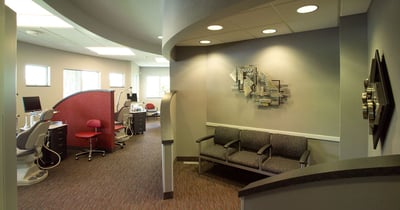
I’d like to address a question that has been posed to me about what makes a contractor specialized in Dental Construction. We’ve claimed for a couple of decades now to be an expert at dental office construction, but what does that mean? There are many out there that think a building is a building, but most Dentists will recognize that a design-builder that’s versed in dental operations will make a big difference in the final building design, quality of construction and completion date.
Dental Building Design
When an architect is familiar with dental operations, they create floor plans that help a Dentist, staff members and patients flow seamlessly through the office. The elements that an architect considers include efficient means for staff to complete tasks, organized patient flow, space and regulations for special equipment, time-saving communication, and aesthetics to make everyone comfortable. An architect that understands how to design a Dental Office that incorporates all the efficiencies listed above will create a layout that allows for less wasted time to move throughout the building, enabling the Dentist to spend more quality time with patients and less time moving around the office to communicate with staff or find tools. When dealing with specialty equipment to take x-rays, distribute med gases, or recover mercury, an architect has to consider spatial issues, electrical needs and regulations. Without an understanding of how this equipment fits into an operation or the regulations involved, a mistake on the plans could trip up the construction phase schedule.
Construction of a Dental Office
For the construction phase, you’ll need a Project Manager and Supervisor that are familiar with the goals and operation of the Dentist. They’re there to oversee the proper installation of the various trades and maintain the schedule and budget. On the same notion as the architect, the Project Supervisor should have experience with x-ray shielding, mercury recovery, and med gases. A Project Supervisor with dental experience is also important to the schedule if a Dentist is renovating an occupied building and needs to continue seeing patients during construction. Your Project Supervisor can create temporary areas to keep chairs open. Regardless if it’s an occupied or new/unoccupied building, the Supervisor and Manager will be monitoring the schedule so that areas are ready in time for equipment delivery.
The Wolgast Way
Wolgast is specialized in the design and construction of Dental Offices. Dentists that we work with feel comfortable knowing that their chair side traps and amalgam separators will be installed without a problem and that their staff and patients will be comfortable in the new space as it’s completed on time and their scheduled move-in date is uninterrupted.

